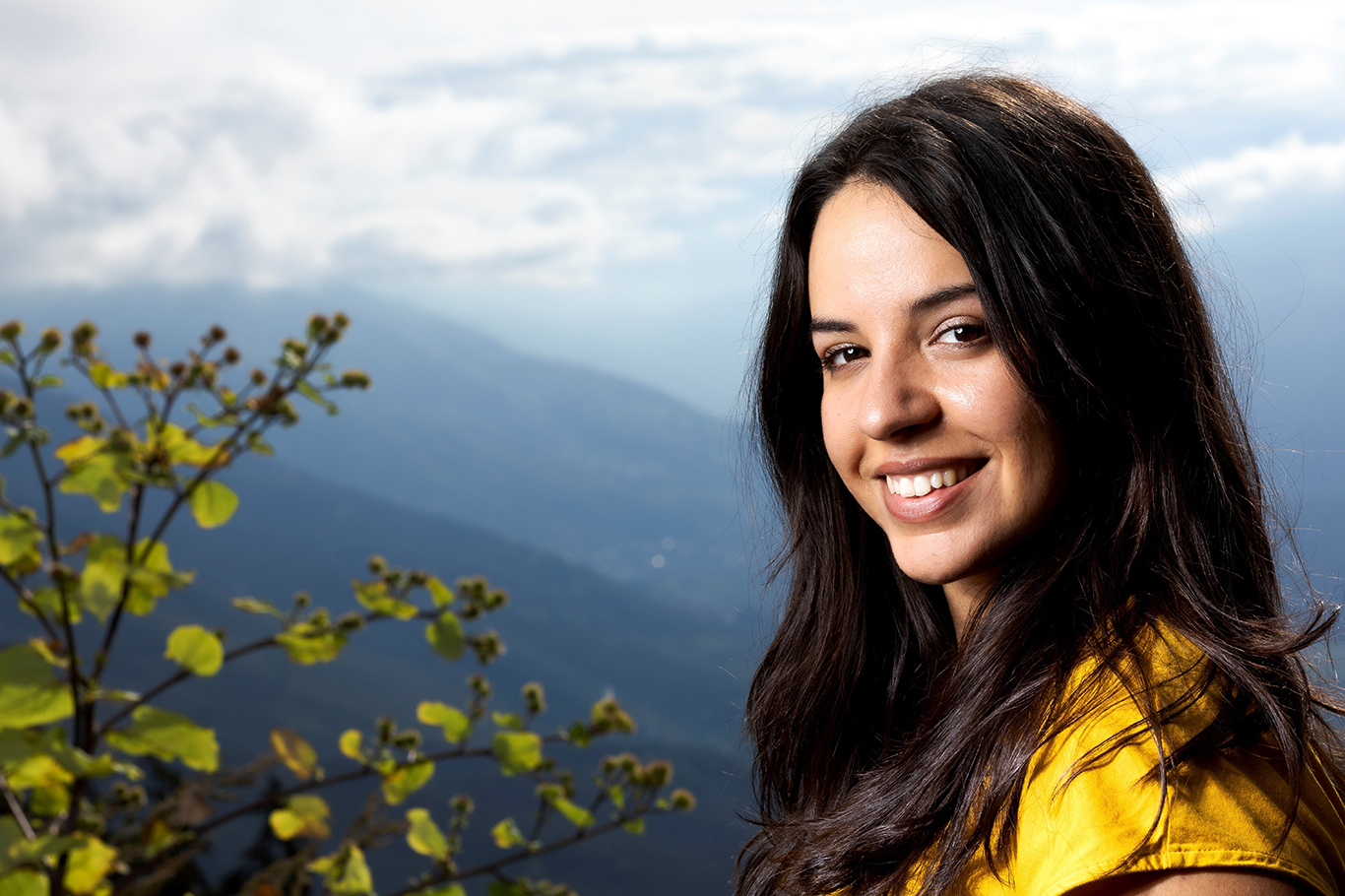Networking science.
“It is important to me to create positive spaces where solidarity is experienced in practice”
She is an award-winning, feminist researcher, enthusiastic snowboarder and dog lover: Stefanie Boulila. With the Young Academy, she is committed to improving the precarious working conditions of women and other minorities in science and to exposing deplorable situations. “There is a great deal to do,” she says in the interview. “And young researchers want to change things.”

Stefanie Boulila, you have been on the Executive Board of the Swiss Young Academy from the outset. What were the challenges over the last 18 months?
It is not an easy undertaking to build a community in the middle of a pandemic. There are many members whom I have never met personally. But despite the physical distance, we have managed to have a debate about shared values and a shared vision, as well as about how we want to make an impact.
The Young Academy is integrated into the Academies’ network. What advantages has this brought, where and how were you able to make particularly good use of this network?
This integration is very important if we are to be heard. It also shows that it’s in the Academies’ interest to give younger members a voice and be open to transformation. Science has to change if it is to be attractive to younger people as an employer as well.
You are a member of a project group that deals with inequalities and precarious working conditions among young academics. What conclusion have you drawn so far?
Our project Challenging Inequalities clearly shows that precarious working conditions are interlinked with the situation of women and other under-represented minorities. Victims of exploitation and discrimination are not protected enough at universities, there are hardly any victim-centred complaint processes – for example, in cases of sexual harassment. Postdocs are in a relationship of dependency and have to fear being additionally disadvantaged if they broach the subject of deplorable situations. We also hear time and again of racism and classism – and that those affected are simply not believed. So, there is a great deal to do, and young researchers want to change things.
“Our project Challenging Inequalities clearly shows that precarious working conditions are interlinked with the situation of women and other under-represented minorities.”
And what contribution does your project make?
In a first stage, the aim was to create an overview and to discuss initial problem areas – for example, with public events. In a follow-up project, we want to tackle the problems practically, for example by forming a network for people affected by racism and classism. Peer support is very important. Although in Switzerland those affected are not yet organized, it has been shown in other countries that such networks are helpful on an individual and institutional level. Another next step is to set up a working group on precarity and inequality as part of the project. It will then be a matter of involving central actors in the higher-education sector in a transformative dialogue.
How did you yourself overcome the challenges you mentioned?
I was very fortunate to be in the right place at the right time. The Centre for Interdisciplinary Gender Studies at the University of Leeds (UK) - where I did my Master’s degree and my dissertation - aims to create a space for budding feminist researchers. It was a very encouraging environment – particularly during the difficult phase of the PhD, which is challenging for everyone. We were given the tools to survive in this neoliberal landscape and that made my career possible. In England, I was also trained to do independent research, which also has to do with the fact that departmental structures predominate in the English-speaking world. These structures are characterized by a diverse professorial and lecturing staff, with both tenured and younger academics, flatter hierarchies and relationships based on mentoring instead of dependency. I have seen time and again how formative positive – but also negative – experiences are for doctoral students and postdocs. That’s why it’s so important to me to create positive spaces where solidarity is experienced in practice.
“I then found in feminist theory the basket in which I could gather my interests in social inequalities.”
How did you get involved in feminist research?
I have always taken a great interest in questions of inequality and solidarity. That probably has to do with my socialization: I grew up in Bern with my grandmother, a Protestant worker. She took in 14 foster children, who would otherwise have become indentured child laborers. Her credo was that all children have the right to grow up in dignity. That had a great influence on me. I then found in feminist theory the basket in which I could gather my interests in social inequalities.
This year you received the renowned Emma Goldman Award from the FLAX Foundation, which “supports excellent researchers in their work on inequality and injustice”. What does this award mean to you?
The beauty of the award is that you don’t need to apply for it. The idea behind it is that good researchers do good research in an area that interests them – regardless of any application system. So, in this way, female researchers get the freedom to do what they really care about. This enables projects to be realized that would otherwise not be possible because they do not meet the funding criteria. An experimental space is created in which the process is the goal.
What will you do with the prize money?
I am writing a book about how democracy is dealt with in contemporary feminist theories. I’m interested in the tension between democracy as a catalyst for social justice and as a means of preserving power structures. I don’t yet know what my conclusion will be in the end (laughs).
And what goal would you like to achieve with the Young Academy in 2022? What role do the Swiss Academies of Arts and Sciences play here?
We want to attract new members. We already have a fantastic group and would like to enable even more young scientists to benefit from this great network. In terms of content, my goal is to use the Young Academy as a space to test things that might be of interest to the rest of the higher-education sector. Specifically, I would like to address with other people the issue of sexual harassment and to reflect on what victim-centred processes might look like. The Swiss Academies play a very central role, as we can’t succeed on our own in taking our concerns to the relevant networks. I hope that the Academies see us as a partner who contributes to innovation and inspiration, that we can help to improve the situation - particularly in the debate about inequalities and working conditions.
Biography
Stefanie Boulila (born in 1986) is a member of the Executive Board of the Swiss Young Academy. After a BA in Communication and Media Research at the University of Fribourg and an MA in Global Genders at the University of Leeds (UK), she completed her PhD in Sociology and Gender Studies at Leeds. During her postdoc at the Georg-August University of Göttingen, she wrote a monograph entitled “Race in Post-racial Europe: An Intersectional Analysis” (Rowman & Littlefield). Since 2019, Stefanie Boulila has been working at the Institute for Sociocultural Development at the Lucerne University of Applied Sciences and Arts, where she is currently in charge of research and has, among other things, conducted an SNSF Spark project on the situation of LGBT-parent families living in the canton of Valais. In 2021, she won an Emma Goldman Award endowed with 50,000 euros. She is an advisory board member of the Think Tank Gender and Diversity, a cooperation project that supports gender-equality strategies at university level. Stefanie Boulila was born in Bern. Today she lives in Crans-Montana. She likes to spend her free time snowboarding or with her chihuahua Kensie from the animal shelter in Berlin.
Swiss Young Academy
House of Academies
Laupenstrasse 7
P.O. Box
3001 Bern
Switzerland
